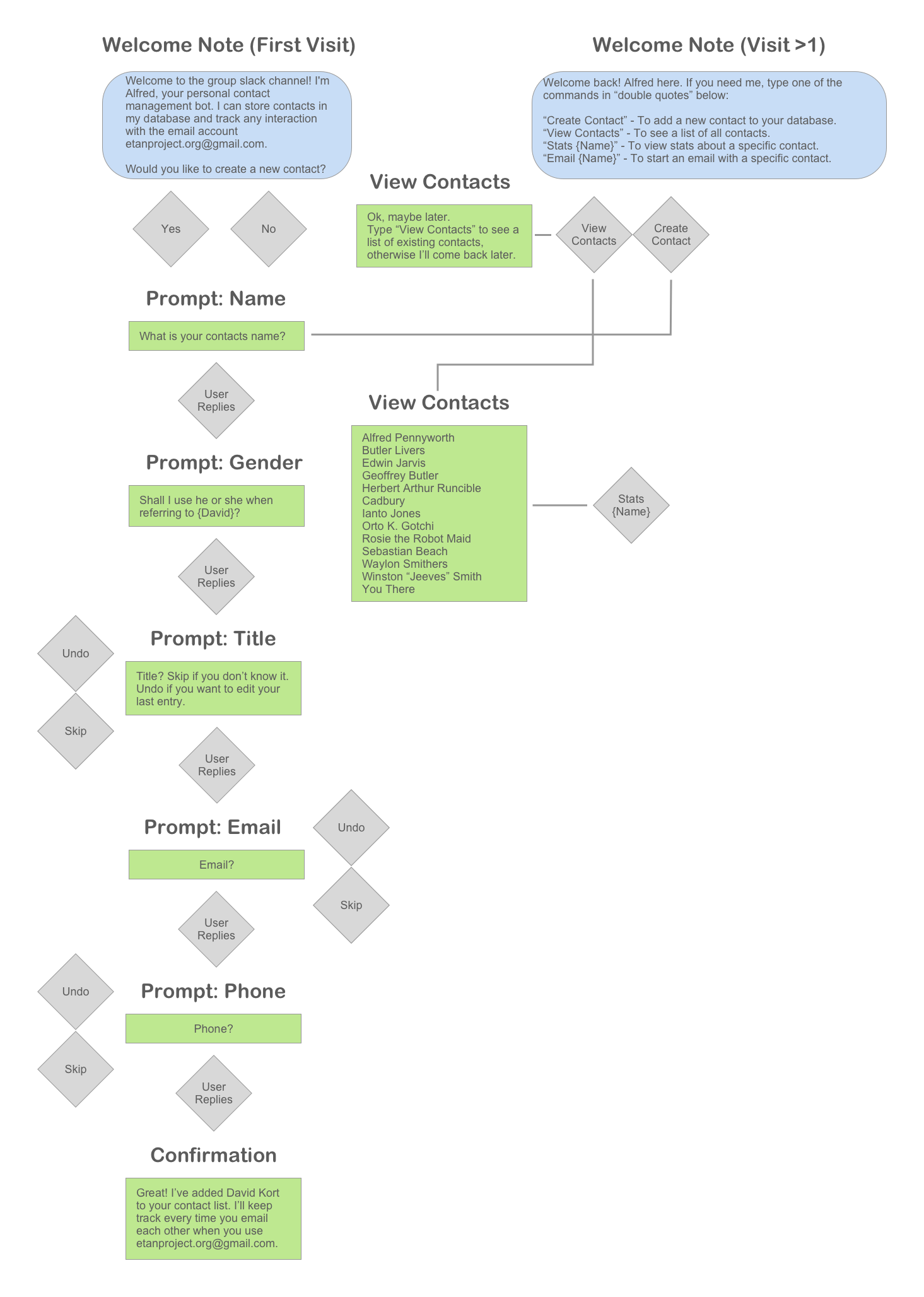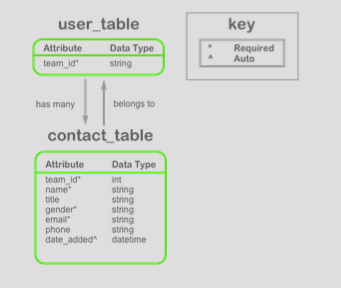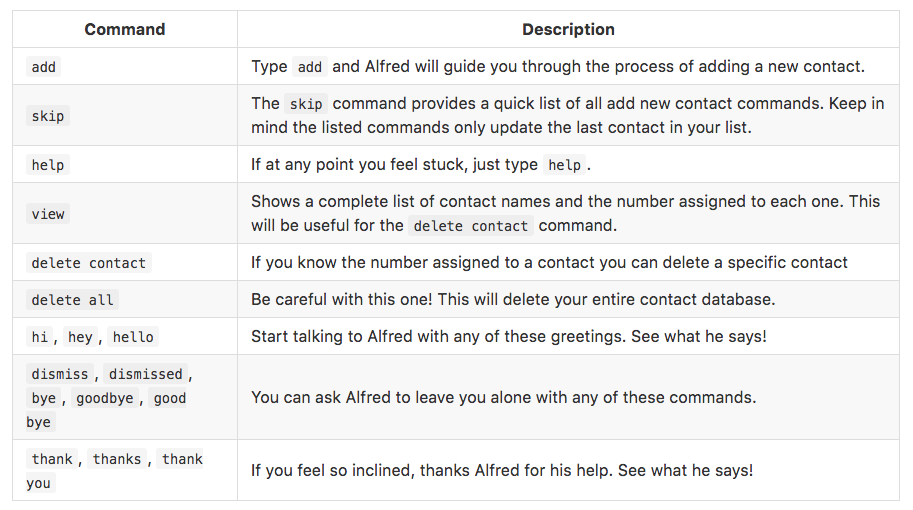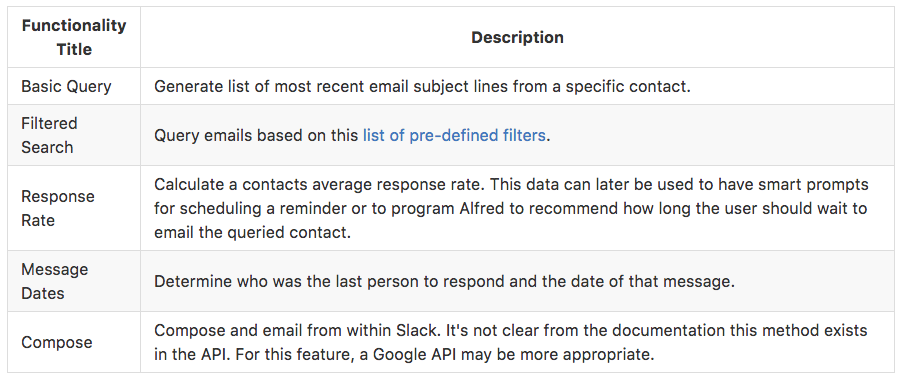module Sinatra
module CommandsCreateContact
# ------------------------------------------------------------------------
# => MAPS THE CURRENT EVENT TO AN ACTION
# ------------------------------------------------------------------------
def create_contact client, event
puts event
puts "Formatted Text: #{event.formatted_text}"
return if event.formatted_text.nil?
is_admin = is_admin_or_owner client, event
# Hi Commands
if ["hi", "hey", "hello"].any? { |a| event.formatted_text.starts_with? a }
client.chat_postMessage(channel: event.channel, text: "I'm Alfred, your personal contact management bot. I monitor activity in your email account etanproject.org@gmail.com and keep track of all your important contacts.", as_user: true)
client.chat_postMessage(channel: event.channel, text: "What would you like to do first? Type `add`, `view`, or `help` for more options.", as_user: true)
return true
# Add New Commands
elsif event.formatted_text == "add"
client.chat_postMessage(channel: event.channel, text: "Who would you like to add? Type `add` and then the First and Last name.", as_user: true)
return true
elsif event.formatted_text.starts_with? "add"
contact_name = event.formatted_text.gsub( "add", "" ).strip
contact = Contact.create(team_id: event.team_id, name: contact_name )
contact.save
client.chat_postMessage(channel: event.channel, text: "I've added _#{ contact.name }_ for you. ", as_user: true)
client.chat_postMessage(channel: event.channel, text: "What is _#{ contact.name }_'s gender? Are the a `male` or a `female`. ", as_user: true)
client.chat_postMessage(channel: event.channel, text: "You can type `skip` at any point to `skip`.", as_user: true)
return true
# Gender Commands
elsif event.formatted_text.starts_with? "male"
contact = Contact.all.last
contact.gender = "male"
contact.save!
client.chat_postMessage(channel: event.channel, text: "So _#{ contact.name }_ is a man. I've updated that. ", as_user: true)
client.chat_postMessage(channel: event.channel, text: "What is his email? ", as_user: true)
return true
# References user's gender for proper pronoun usage.
elsif event.formatted_text.starts_with? "female"
contact = Contact.all.last
contact.gender = "female"
contact.save!
client.chat_postMessage(channel: event.channel, text: "So _#{ contact.name }_ is a woman. I've updated that. ", as_user: true)
client.chat_postMessage(channel: event.channel, text: "What is her email? ", as_user: true)
return true
# Email Commands
# Uses the is_email_address validation method defined below.
elsif is_email_address event.formatted_text
contact = Contact.all.last
contact.email = event.formatted_text
contact.save!
client.chat_postMessage(channel: event.channel, text: "I've associated the email `#{contact.email}` with _#{ contact.name }_. ", as_user: true)
if contact.gender == "male"
client.chat_postMessage(channel: event.channel, text: "What's his phone number? Type `phone` followed by the 10 digit number (numbers only, no `-` or `( )`).", as_user: true)
else
client.chat_postMessage(channel: event.channel, text: "What's her phone number? Type `phone` followed by the 10 digit number (numbers only, no `-` or `( )`).", as_user: true)
end
return true
# Phone Commands
elsif event.formatted_text.starts_with? "phone"
contact_number = event.formatted_text.gsub( "phone", "" ).strip
contact = Contact.all.last
contact.phone = contact_number.to_i
contact.save!
client.chat_postMessage(channel: event.channel, text: "I've updated _#{ contact.name }_'s phone number as #{contact.phone}.", as_user: true)
client.chat_postMessage(channel: event.channel, text: "What would you like to do next? To view your contacts, type `view`. To add another contact, type `add` and then the first and last name.", as_user: true)
return true
elsif event.formatted_text.starts_with? "skip"
contact = Contact.all.last
client.chat_postMessage(channel: event.channel, text: "Let's speed things up a bit.", as_user: true)
client.chat_postMessage(channel: event.channel, text: "To update #{ contact.name }'s gender, type `male` or `female`", as_user: true)
client.chat_postMessage(channel: event.channel, text: "To update #{ contact.name }'s email, simple type their email address.", as_user: true)
client.chat_postMessage(channel: event.channel, text: "To update #{ contact.name }'s phone number, simple type `phone` followed by the 10 digit number (numbers only, no `-` or `( )`).", as_user: true)
return true
# # add additional commands here...
else
client.chat_postMessage(channel: event.channel, text: "Terribly sorry, 'ol chap. I don't understand the youth these days. Type `help` and we'll get this sorted out.", as_user: true)
return true
end
end
# ------------------------------------------------------------------------
# => GETS USEFUL INFO FROM SLACK
# ------------------------------------------------------------------------
# NOTE: I made an attempt to validate the phone number using a variety of gem files and regex codes, but so far I haven't been able to get it to work.
# def is_phone_number int
# return int.match( ((\(\d{3}\) ?)|(\d{3}-))?\d{3}-\d{4} )
# end
#Email validation using regex
def is_email_address str
return str.match(/[a-zA-Z0-9._%]@(?:[a-zA-Z0-9]+\.)[a-zA-Z]{2,4}/)
end
def get_user_name client, event
# calls users_info on slack
info = client.users_info(user: event.user_id )
info['user']['name']
end
def is_admin_or_owner client, event
# calls users_info on slack
info = client.users_info(user: event.user_id )
info['user']['is_admin'] || info['user']['is_owner']
end
end
end
Click to Expand





